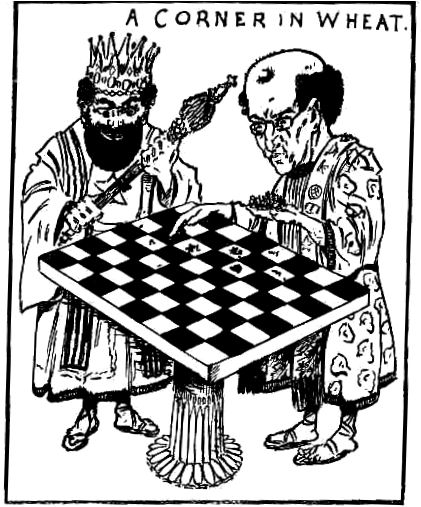



ACCORDING TO ENCYCLOPEDICAL lore, the royal game, or what is now known as chess, was invented by a Hindoo named Sessa, and the king of that country, Shevan the Great, asked Sessa what reward he demanded for his wonderful game. Sessa astonished the king by the apparent moderation of his demand, viz., one grain of wheat for the first square of the chess-board, two for the second, four for the third, eight for the fourth, and so on, always doubling for each square up to the sixty-fourth fourth square of the chess-board.
The king accepted the proposition and referred Sessa to his accountant and treasurer, but was astounded to lean that the entire world could not raise sufficient wheat, in one hundred years to pay the debt. Sessa insisted upon the payment of his debt and claimed the ownership of all the wheat of the world.
The game was originally called the royal game, but the king in his mortification named it chess, which, as explained in Webster, is the name of a vile weed which causes the blight in wheat. To the average mortal the amount of wheat which would be required to pay the debt to Sessa is so large that mind fails to grasp its immensity, yet, when the story was told to Steinitz he exclaimed: ŌĆ£It is not true; no sane man would have sold such a great invention, even for a thousand times as much!ŌĆØ
The game became popular, however, and so developed and strengthened the gray matter in the brain of the king that he was enabled to solve the great Indian chess problem and save his country. Calling Sessa to him he said; ŌĆ£It is an easy matter to tell how much wheat must be given to you, but the same must be counted accurately. So yourself and as many assistants as you care to engage must go to the public granary and carry away all the wheat you can count, but if your count is not correct you will loose your head for cheating the treasury.ŌĆØ When Sessa found that a man to whom he had to pay half a rupee a day could not count the grains of wheat in a bushel in two weeks, and that he could buy six bushels for a yen, he threw up the game
There is said to be a royal road to the solution of this problem, which our puzzlists may use if they can discover it; nevertheless it should be an easy problem in simple arithmetic to tell just how many grains of wheat Sessa was entitled to.
In that odd bit of encyclopedia lore, regarding the agreement made by Sheran, the Indian King, to reward Sessa for inventing the game of chess by giving him one grain of wheat for the first square, two for the second, four for the third, etc., always doubling up to the 64th square, it was asked to tell how many grains of wheat would be required to pay the debt.
It is a question of simple multiplication for anyone who can do sixty-three sums without an error, and when we see the answer it looks easy and yet no human mind realizes or grasps its immensity. It was easy for Sessa to compute his store of wheat, but to count the grains was a different matter.
A trillion is a small number if you say it quick, yet we cannot grasp it. According to the old legend the ŌĆ£Wandering JewŌĆØ was to walk the earth until he counted a trillion. If he could count one a second for ten hours a day it would be a 75,000 year contract. So do not waste any brain energy in endeavoring to take in the immensity of 18,446,744,073,709,551,615 grains of wheat!
In this problem of doubling each successive square until 64 squares are reached would give ua a table running like this,
1 -- 1
2 -- 2
4 -- 3
8 -- 4
16 -- 5
32 -- 6
64 -- 7
128 -- 8
256 -- 9
512 -- 10
1024 -- 11
2048 -- 12
4096 -- 13
8192 -- 14
16384 -- 15
32768 -- 16
65536 -- 17
etc., etc.,
which is known as an arithmetical progression. To contiue this up to 64 and then adding for the sum total becomes somewhat laborious, especially when the upper numbers are reached. It then becomes a question, ŌĆśCan this be reached by a shorter method?ŌĆÖ
A glance at the table shows certain characteristics, that the amounts bear certain relations to each other. For instance, the 3d and 5th terms multiplied together give us the amount for the 7th term; the 6th and 12th for the 17th, the 7th by the 7th for the 13th and so on infinitum, which seems to give us a rule that by adding the numbers and subtracting one we get the number of the term they produce.
According to the above the 8th term (for instance) multiplied by itself would give us the 15th term (8 + 8 - 1 = 15), that is 128 X 128 = 16,384, for the 15th term.
Now, according to the rule, the 15th term, multiplied by itself, would give us (15 + 15 - 1 = 29), the 29th term, that is 16,384 X 16,384 equals 268,435,456 for the 29th term.
Then the 29th term multiplied by itself would give us (29 + 29 ŌĆ” 1 = 27), the 57th term, or, in other words, 268,435,456, multiplied by itself gives 72,057,594,037,927,936, for the 57th term.
Still applying the rule, multiply the 57th term by the 8th (57 + 8 ŌĆ” 1 = 64), for the last or 64th term, that is 72,057,594,037,927,936 X 128 gives 9,223,372,036,854,775,808 for the last term.
Now all of the 64 terms must be added together. This would be a pretty big addition, enough to frighten the average school boy. This is overcome by a very simple rule: The sum of an arithmetical progression is found by doubling the last term and subtracting the first term from it, thus we can easily find the sum total to be 18,446,744,073,709,551,615 kernels demanded by this checker-board proposition.
2. A Rebus
My first is a letter, an insect, a word
That means to exist, it moves like a bird.
My next is a letter, a small part of man.
'Tis found in all climes; search when you can.
My third is a something seen in all brawls,
My next you will find in elegant halls
My last is the first of the last part of day,
Is ever in earnest, but never in play,
My whole gives a light by some men abhorred,
The blessings from which no pen can record.
Cipher Ans. 2, 9, 2, 12, 5.
BIBLE
3. Charade
When Kate the cook prepared the meal,
My first was in request;
My next is seen in Lamb and veal,
A quarter or a breastŌĆ”
Which with my whole the table graced,
And truly ŌĆÖtwas no wonder,
When at the board each guest was placed.
To see my third thrown under.
KateŌĆÖs charade turned upon the word potatoes.
4. A Riddle
Just equal are my head and tail,
My middle slender as can be,
Whether I stand on head or heal,
Is all the same to you or me
But if my head should be cut off,
The matter's true, although quite strange.
My head and body severed thus
Will then at once to nothing change.
Cipher Ans. 6, 9, 7, 21, 18, 5, 8.
FIGURE 8.
5.
When is a soldier a very charitable person? When he presents arms (alms).
Why is the earth like a school slate? Because boys and girls multiply on the face of it.
Which is the coldest river? The ice is (Isis).
[Page 134]